
Image: Pixabay
Omega-3 fatty acids are often discussed in the context of fitness and physical health, but they often go unnoticed in the context of mental wellness. Still, Omega-3s have immense potential to reshape one’s pursuit of a more balanced mind as they can help with managing mood, tackling stress, and enhancing cognitive prowess.
Our brain is the engine that powers our life, and like any engine, it needs quality fuel to work at optimal parameters. This is why the diet-mental health link is so important. Therefore, today, we’ll have a look at how Omega-3s can impact your mental health and the best sources to include in your diet.
Nourishing Your Mind: The Diet-Mental Health Connection
The mind and body are not just connected – they’re deeply symbiotic. What fuels your body also fuels your thoughts, emotions, and cognitive functions. This is why a proper diet rich in nutrients like Omega-3 fatty acids can be an ally for mental health and overall well-being. Additionally, incorporating functional mushrooms like lion’s mane and reishi into your diet may provide complementary benefits for mental health due to their adaptogenic properties and bioactive compounds.
Fatty acids are fundamental building blocks in the structure of neurons, and Omega-3s, specifically, have roles that extend beyond structural integrity. They modulate brain chemistry and strongly impact mood and cognition. Additionally, Omega-3s also play a role in keeping body inflammation under control.
But Omega-3s are not the only dietary nutrients that impact your mental well-being. Amino acids found in protein sources are precursors to neurotransmitters like serotonin and dopamine, which influence mood and alertness. Also, due to the gut-brain axis, foods that promote a healthy gut microbiome, such as those high in fiber, prebiotics, and probiotics, can positively affect mood and cognitive function.
Overall, what you eat impacts the way you feel, think, and function. Omega-3s are some of the most important elements of your nutrition, but they are not the only ones.
Where to Get Omega-3s
The most common source of Omega-3s is fatty fish like salmon or mackerel. But if you prefer your meals without fins or scales, there are plant-based sources brimming with Omega-3s. Flaxseeds, chia seeds, walnuts, and algae-based supplements ensure that everyone has access to this nutrient powerhouse.
A bit of online research will help you learn more about Omega-3 supplements and how to incorporate them into your diet. It’s also a good idea to talk with your healthcare provider before starting supplementation.
5 Ways Omega-3s Transform Your Mental Health Journey
Just like there’s a link between oral health and mental well-being, there’s also a link between what you eat and how your mind feels. Here are five ways a diet rich in Omega-3s can strengthen your mental health and well-being.
1. Mood Modulation
Consistent intake of Omega-3s can act as a moderator for your mood swings.
These fatty acids are components in the brain’s signaling systems that regulate emotions, and research indicates that a diet rich in Omega-3s can help soften the oscillations of moods commonly experienced with conditions such as depression.
2. Stress Under Siege
Everyone experiences high-pressure moments, but when you have the right tools, you can decide how you respond. Omega-3 fatty acids help mitigate the effects of stress hormones like cortisol and adrenaline and provide you with the fortitude to stay calm and avoid overthinking.
3. Cognitive Clarity
As architects of brain cell membranes, Omega-3s contribute to maintaining neuron flexibility, which is essential for information flow and memory function. This is akin to oiling the gears of your cognitive machinery, ensuring smoother operation and potentially slowing age-related decline.
4. Inflammation Inhibition
Chronic inflammation influences numerous health conditions including those affecting brain health. Studies show it may accelerate the aging process in the brain, potentially leading to cognitive deficits and an increased risk of diseases like Alzheimer’s and other dementias.
Additionally, inflammatory markers might disrupt neurotransmitter systems, which could contribute to depression and anxiety. Long-standing inflammation can also lead to structural changes in the brain, including neuron damage and reduced plasticity, affecting learning and memory.
To prevent all these, healthcare specialists recommend a diet rich in Omega-3s and antioxidants. Omega-3s possess strong anti-inflammatory properties, which may help prevent neurodegenerative diseases.
5. Proper Sleep Routine
A good sleep routine is non-negotiable for mental acuity and overall well-being. When you sleep, the brain is hard at work repairing and consolidating memories, regulating emotions, and reducing stress. Essentially, quality sleep acts as a nightly reset that supports overall psychological resilience and well-being.
A diet rich in Omega-3s has been linked with better sleep quality in both adults and children. These fatty acids appear to regulate the sleep hormone melatonin, making it easier to fall asleep and stay so.
Wrap Up
In the theater of mental wellness, Omega-3 fatty acids deserve a standing ovation. From mood regulation and stress resistance to cognitive protection and sleep quality, Omega-3s have proven their merit.
So, the best thing you can do for your mental health in the long term is to spruce up your diet by adding foods and supplements that increase the intake of Omega-3 fatty acids.
MindOwl Founder – My own struggles in life have led me to this path of understanding the human condition. I graduated with a bachelor’s degree in philosophy before completing a master’s degree in psychology at Regent’s University London. I then completed a postgraduate diploma in philosophical counselling before being trained in ACT (Acceptance and commitment therapy).
I’ve spent the last eight years studying the encounter of meditative practices with modern psychology.

